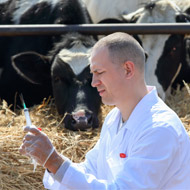
Latest reports reveal new and ongoing bTB breakdowns
Farmers must make more effort to avoid the spread of bovine tuberculosis (bTB), a new government report suggests.
The recommendation is made in the latest epidemiological reports from Defra, which cover the low bTB risk areas and edge areas of England.
Published on Wednesday (16 November), the reports are designed to give cattle keepers and vets a clear analysis of the bTB situation in their area.
The reports pull together statistics on new and ongoing bTB breakdowns in England at county level and include an assessment of local risk factors which may contribute to TB incidents.
In the Midlands, the number of bTB cases in the first six months of 2016 increased by 10 (from 80 to 90 new breakdowns) compared with the same period in 2015.
The report states that a Defra-funded badger vaccination scheme has been suspended due to a shortage of vaccine. It adds that the impact upon the risk of disease spread is unclear.
“The risk of transmission of disease by the inward movement of infected cattle to or between holdings in the Edge Area remains a concern,” the document adds.
“The continued lack of a concerted industry drive to implement voluntary risk-based trading strategies is a driver for a proportion of the epidemic or risk of spread.”
The picture is similar in the South-East. In 2016, there were substantially more bTB breakdowns in the first six months - predominantly in Hampshire and Oxfordshire.
“The majority (62 per cent) of all 2016 cases can be attributed to purchases of infected cattle; this potentially could be due to change of industry’ behaviour and a significant drop in confidence in the Low-Risk Area,’ says the report.
In Cheshire, the situation appears to be improving. The report reveals that the number of fully confirmed cases has decreased by 17 per cent in 2016, compared to the same period in 2015.
“This may be in part due to the fact that six monthly whole herd TB testing is entering its second year in the Cheshire Edge and disease is being detected earlier,” it says.
The increased cattle controls in the Cheshire Edge Area have been effective and are expected to continue to enable earlier detection of disease and reduce overall reactor numbers over time.
However, Defra expects that this effect will plateau unless the infection challenge posed by badgers, particularly in east Cheshire, is facilitated through wildlife control measures.



 The latest
The latest